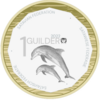Satavian guilder: Difference between revisions
(Created page with "{{Infobox currency | currency_name = Satavian guilder | currency_name_in_local = ''{{wpl|Afrikaans|Asteriaans}}: Satawiese gulden''<br>''{{wpl|Dutch language|Hennish}}: Satavi...") |
No edit summary |
||
| Line 41: | Line 41: | ||
| subunit_name_1 = {{wpl|cent}} | | subunit_name_1 = {{wpl|cent}} | ||
| subunit_inline_note_1 = | | subunit_inline_note_1 = | ||
| symbol = {{wpl|Guilder|G}} | | symbol = {{wpl|Guilder|G}} | ||
| alt_symbol_title_1 = | | alt_symbol_title_1 = | ||
| alt_symbol_1 = | | alt_symbol_1 = | ||
| Line 63: | Line 63: | ||
| value = | | value = | ||
| printer_website = | | printer_website = | ||
| mint = | | mint = [[Estmere|Federal Estmerish Mint]] | ||
| mint_website = | | mint_website = {{url|mint.gov.es}} | ||
| obsolete_notice = | | obsolete_notice = | ||
| footnotes = | | footnotes = | ||
}} | }} | ||
The '''Satavian guilder''' ({{wpl|Afrikaans|Asteriaans}}:'' Satawiese gulden'', {{wpl|Dutch language|Hennish}}: ''Satavisch gulden''; {{wpl|currency sign|sign}} '''G'''; {{wpl|ISO 4217|code}}: '''SVG''') is the official currency of [[Satavia]], and is {{wpl|legal tender}} in [[Naua Roa]]. | |||
Introduced in 1943, the Guilder replaced the [[Satavian shilling]] and is subdivided into 100 cents. The guilder has 8 coins and 5 banknotes, with the smallest being the [[Satavia guilder#Coins|1-cent coin]], which together with the [[Satavia guilder#Coins|2-cent coin]] are still minted, although rarely used. | |||
==History== | |||
The Satavian guilder was introduced on January 1, 1943 as the {{wpl|decimalised}} replacement to the [[Satavian shilling]]. The shilling had utilised the {{wpl|£sd}} system, as was common in former colonies and territories of [[Estmere]], which by 1943 was regarded as complicated and obsolete. The Satavian shilling remained legal tender in Satavia until January 1, 1946. The shilling was introduced by the [[National party (Satavia)|National party]] government of [[Christiaan Pienaar]]. The National party had launched a coup in February 1939 that had removed the democratically elected government of [[Edward Limes]], and as part of the new government's programme of "decolonisation" (Satavia had only achieved independence from Estmere in 1936) decimilisation of shilling was introduced. The currency was renamed the Guilder (as it had been before Estmere seized control of Satavia in 1747) and was initially pegged to the [[Estmerish shilling]] at par, before it was devalued in 1959 to £1 = G1.5 | |||
Revision as of 15:10, 22 July 2022
| Asteriaans: Satawiese gulden Hennish: Satavisch gulden | |||||
|---|---|---|---|---|---|
| |||||
| ISO 4217 | |||||
| Unit | |||||
| Symbol | G | ||||
| Denominations | |||||
| Subunit | |||||
| 1:100 | cent | ||||
| Symbol | |||||
| cent | c | ||||
| Banknotes | |||||
| Freq. used | G5, G10, G20, G50, G100 | ||||
| Rarely used | No longer in use: G1, G2 | ||||
| Coins | |||||
| Freq. used | 5c, 10c, 20c, 50c, G1, G2 | ||||
| Rarely used | 1c, 2c | ||||
| Demographics | |||||
| Date of introduction | January 1, 1943 | ||||
| Replaced | Satavian shilling | ||||
| User(s) | |||||
| Issuance | |||||
| Central bank | Reserve Bank of Satavia | ||||
| Website | rbs | ||||
| Printer | Federal Printing Office | ||||
| Mint | Federal Estmerish Mint | ||||
| Website | mint | ||||
| Valuation | |||||
| Inflation | 5.5% | ||||
The Satavian guilder (Asteriaans: Satawiese gulden, Hennish: Satavisch gulden; sign G; code: SVG) is the official currency of Satavia, and is legal tender in Naua Roa.
Introduced in 1943, the Guilder replaced the Satavian shilling and is subdivided into 100 cents. The guilder has 8 coins and 5 banknotes, with the smallest being the 1-cent coin, which together with the 2-cent coin are still minted, although rarely used.
History
The Satavian guilder was introduced on January 1, 1943 as the decimalised replacement to the Satavian shilling. The shilling had utilised the £sd system, as was common in former colonies and territories of Estmere, which by 1943 was regarded as complicated and obsolete. The Satavian shilling remained legal tender in Satavia until January 1, 1946. The shilling was introduced by the National party government of Christiaan Pienaar. The National party had launched a coup in February 1939 that had removed the democratically elected government of Edward Limes, and as part of the new government's programme of "decolonisation" (Satavia had only achieved independence from Estmere in 1936) decimilisation of shilling was introduced. The currency was renamed the Guilder (as it had been before Estmere seized control of Satavia in 1747) and was initially pegged to the Estmerish shilling at par, before it was devalued in 1959 to £1 = G1.5

